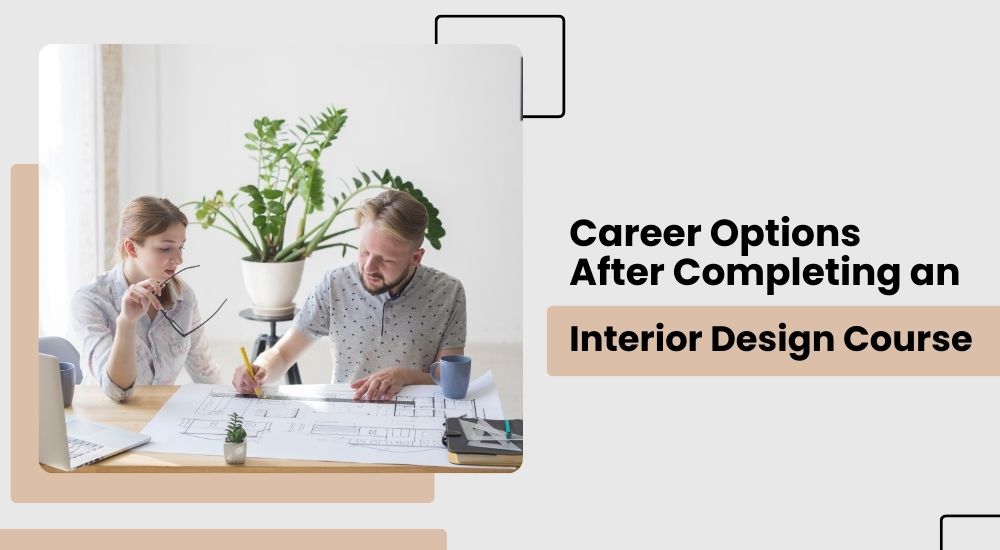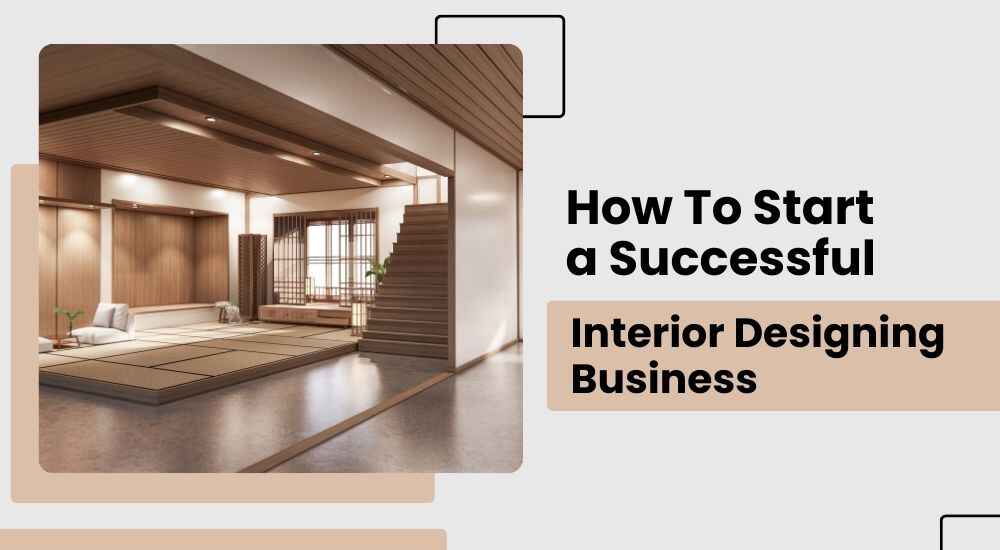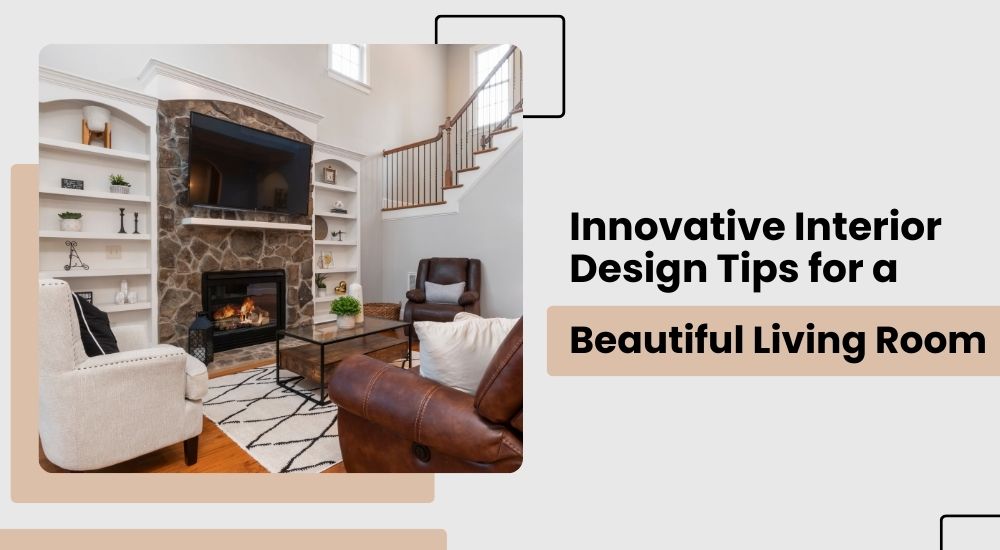
Table of Contents
ToggleExploring Career Options After Completing an Interior Design Course
Interior design is a vibrant field that merges creativity with hands-on skills in transforming space within an environment, rendering it pleasant and functional. As the industry of interior design keeps altering with time, completion of an interior design course opens career avenues galore for one to choose from. We will discuss in this blog some of the sought-after career options that one can get with an interior design qualification and advice on what to do once your course is complete.
Exploring Career Paths After Completing Your Interior Design Degree
After completing your interior design degree, a world of career opportunities awaits. You can work as an interior designer, space planner, or design consultant, or explore roles in project management, furniture design, and even real estate staging.
Residential Interior Designer
One of the most popular career directions for graduates of interior design is residential interior design. You will work directly with homeowners to create personalized living areas, that reflect both their tastes and functional needs. This could range from space planning and color schemes to furniture selection and lighting design.
- Career Scope: Trends in home renovation and personalization make the demand for residential interior designers very high. Access to design ideas through platforms such as Houzz and Pinterest means that more and more clients are hiring professionals to help execute their ideas. The successful residential interior designer usually runs an independent practice or is part of a design firm and often works in collaboration with architects and builders.
- Key Skills:
- Strong understanding of color theory and design principles
- Create detailed floor plans with 3D renderings.
- Excellent communication and project management with the client
Commercial Interior Designer
Commercial interior designers are concerned with creating an appropriate working environment or space, which is both functional and aesthetically pleasing, for business concerns such as offices, retail shops, hotels, restaurants, and more. Interior designers aim to create environments that enhance user experience and improve productivity, all while reflecting a brand’s unique identity. With the right skills and vision, you can also start your own interior design business.
- Career Scope: As businesses increasingly realize that design can influence customer experience and employee satisfaction, commercial interior designers are in high demand. The projects are often bigger with larger teams to oversee, which leads to lucrative job opportunities in the industry.
- Key Skills:
- Knowledge of commercial space planning and ergonomics.
- Knowledge of building codes and regulations.
- Ability to handle multiple projects simultaneously.
Interior Design Consultant
An interior design consultant advises clients looking to improve their space, either at home or within their office space. This service differs from the traditional process in that the consultants do not conduct the actual design implementation but instead propose strategy and recommendations.
- Career Scope: This could be a fantastic role for those who love the idea of varied projects where they can provide personalized advice. Consultants may practice alone or in a consultancy, and some have specialized areas of expertise in sustainable design or even luxury interiors.
- Key Skills:
- Excellent analytical and problem-solving skills
- Excellent knowledge of current design trends and materials
- The Ability to communicate ideas effectively.

Set Designer for Film and Television
Set designers are responsible for providing a visual setting in film, television, and theatre productions. This encompasses set design and building that would increase the potential of the storyline and the visual effect of a performance.
- Career Scope: The entertainment industry opens up inspiring opportunities for interior design graduates who are considering a more unconventional career path. With the rise in streaming services, there is always a high demand for new content, and hence set designers, who can plan engaging and realistic environments for media formats.
- Key Skills:
- Strong artistic and creative vision.
- Ability to work under tight deadlines.
- Collaboration with the directors, producers, and other designers.
Exhibit Interior Designing
Exhibit designers design displays for museums, trade shows, and exhibitions. This area melds interior design principles with an understanding of spatial dynamics and the engagement of visitors.
- Career Scope: Exhibitions and trade shows are gradually increasing all over the world. Therefore, the need for exhibit designers has come into existence who can create interactive and communicative displays that maintain viewer attention and communicate information efficiently.
- Key Skills:
- Design for different types of spaces and audiences.
- Proficient in design software usage, such as 3D modeling;
- Strong problem-solving and project management skills.
Furniture Designers
Furniture designers focus on the creation of functional but stylish furniture pieces that enhance space. It may also include designing bespoke pieces for clients or working with manufacturers to create new collections.
- Career Scope: With growing demands for unique and well-designed furniture, people strive to make their living spaces unique. Independent, with design firms, or with furniture manufacturers are the places where a furniture designer can work.
- Key Skills:
- Strong understanding of materials and construction techniques.
- Creativity and detailing.
- Design sketches and prototypes.
Sustainable Design Specialist
Designers specializing in sustainable design underscore the importance of environmentally friendly and energy-efficient interiors. The main tasks of the professionals involved might include specifying sustainable materials, integrating ways of implementing energy-saving technologies, and practicing environmentally friendly methods.
- Career Scope: As environmental degradation is becoming a growing concern, the demand for interior designers offering sustainable solutions is also on the rise. For a person who is interested in the conservation of the environment and innovative practices of design, this career path will be interesting and challenging.
- Key Skills:
- Knowledge of sustainable materials and building methods.
- Able to apply green technologies in design.
- Knowledge of environmental regulations and certification.
What to Do After Completing Your Interior Design Course
- Build a portfolio: The portfolio will be important in exposing you to potential employers or clients regarding your skill and design style. Include projects you have dealt with that are varied in range, from residential and commercial designs to conceptual work.
- Gain Work Experience: Try to do an internship or take some kind of entry-level job to help you gain practical experience. Find opportunities to work with established designers or firms to learn more valuable and practical insights into the profession.
- Get Certification: Certification or licensing may be compulsory in the area where you are going to practice your profession. Look into the requirements for your area and add to your skills by pursuing certification from relevant, recognized industry bodies.
- Network with Industry Professionals: Go out there and attend industry events, join associations, and connect with other designers. Networking might open windows for job opportunities, collaborations, and professional development.
- Stay Updated with industry Trends: The profession of interior design is continually evolving. Stay updated on new trends, materials, and technologies by reading industry publications, workshops, and continuing education.
- Consider Specialization: You will develop expertise over time in an area of interior design. Specialization can be in sustainable design, commercial interiors, or furniture design, which will give you a niche in the competitive job market.
Conclusion
Completing the interior designing business starts many career paths to choose from, each has its challenges and rewards. If you want to build your career in the interior design field, you can rely on SIID Pune. We offer the best interior design course in Pune, complete with 100% placement assistance.
Our program equips you with the skills needed to create a standout portfolio and gain practical experience, ensuring you stay updated with the latest trends in the profession.From residential to commercial and even specialized design, the course in interior design can provide a very strong foundation for your future career. A strong portfolio, practical experience, and updating yourself with the latest in the profession are ways to successfully negotiate varied careers as an interior designer.



